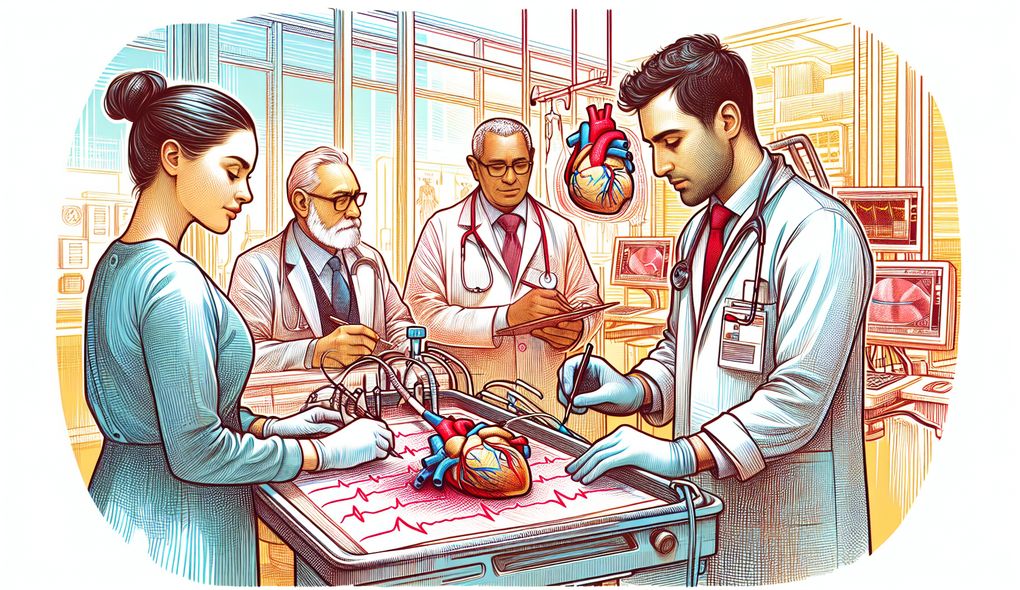Share an experience where you successfully used angioplasty and stent insertion to treat blocked arteries in a patient.
INTERMEDIATE LEVEL

Sample answer to the question:
In my previous role as an Interventional Cardiologist, I had a patient who presented with blocked arteries. After a thorough assessment using diagnostic tests like angiograms, we determined that angioplasty and stent insertion were necessary to treat the condition. During the procedure, I carefully conducted the angioplasty by inserting a balloon catheter into the blocked artery and inflating it to widen the artery, allowing for improved blood flow. Subsequently, a stent was inserted to keep the artery open and prevent it from re-narrowing. The patient responded well to the treatment, and post-operative care included medication management, lifestyle changes, and regular follow-ups to monitor their cardiovascular health.
Here is a more solid answer:
During my time as an Interventional Cardiologist, I encountered a patient with blocked arteries where angioplasty and stent insertion were the recommended treatments. After conducting thorough diagnostic tests, including angiograms, I carefully performed the angioplasty procedure by delicately inserting a balloon catheter into the blocked artery and then inflating it to expand the narrowed section. This allowed for improved blood flow and alleviated the patient's symptoms. Following the angioplasty, I skillfully inserted a stent to keep the artery open, preventing re-narrowing. The patient's condition significantly improved post-procedure, and we implemented a comprehensive post-operative care plan involving medication management, lifestyle modifications, and regular follow-up appointments to monitor their cardiac health.
Why is this a more solid answer?
The solid answer includes more specific details of the procedure, showcasing the candidate's proficiency in interventional cardiology techniques and procedures. It also highlights their diagnostic skills, clinical decision-making abilities, and their understanding of post-operative care. However, it could benefit from further elaboration on communication skills and emergency response capabilities.
An example of a exceptional answer:
Having worked as an Interventional Cardiologist, I encountered a case that required the use of angioplasty and stent insertion to address blocked arteries in a patient. Following a comprehensive evaluation, including angiograms, we determined that this procedure was the most appropriate course of action to restore blood flow and improve the patient's cardiovascular health. During the angioplasty, I meticulously navigated the intricate network of arteries, using an advanced balloon catheter to gently dilate the narrowed segment, allowing for optimal blood flow restoration. To ensure long-term efficacy, I skillfully deployed a drug-eluting stent, tailored to the patient's specific anatomy, to maintain the arterial patency and minimize the risk of future complications. The patient responded exceptionally well, with a significant improvement in symptoms and overall cardiac function. Communication played a vital role throughout the process, providing clear explanations to the patient about the procedure and counseling on necessary lifestyle modifications. Additionally, my emergency response capabilities allowed for effective decision-making during unforeseen challenges that may have arisen during the procedure. Post-operatively, we implemented a personalized care plan, focusing on medication management, regular follow-ups, and ongoing patient education to empower them to maintain a heart-healthy lifestyle.
Why is this an exceptional answer?
The exceptional answer provides a comprehensive and intricate description of the angioplasty and stent insertion procedure. It showcases the candidate's expertise, precision, and decision-making abilities, while also highlighting their excellent communication skills in patient consultation and education. Additionally, it emphasizes their emergency response capabilities, making them a well-rounded candidate for the interventional cardiologist position.
How to prepare for this question:
- Familiarize yourself with the latest advancements in interventional cardiology techniques and procedures, particularly angioplasty and stent insertion.
- Practice explaining complex medical procedures and conditions to patients in a clear and understandable manner.
- Develop your skills in diagnostic tests and interpretation, particularly angiograms, to accurately determine the appropriate treatment.
- Train in clinical decision-making, considering factors such as patient history, risk assessment, and potential complications.
- Participate in emergency response simulations or drills to enhance your ability to remain composed under pressure while making critical decisions.
What are interviewers evaluating with this question?
- Interventional cardiology techniques and procedures
- Diagnostic skills
- Clinical decision-making abilities
- Communication skills
- Emergency response capabilities

